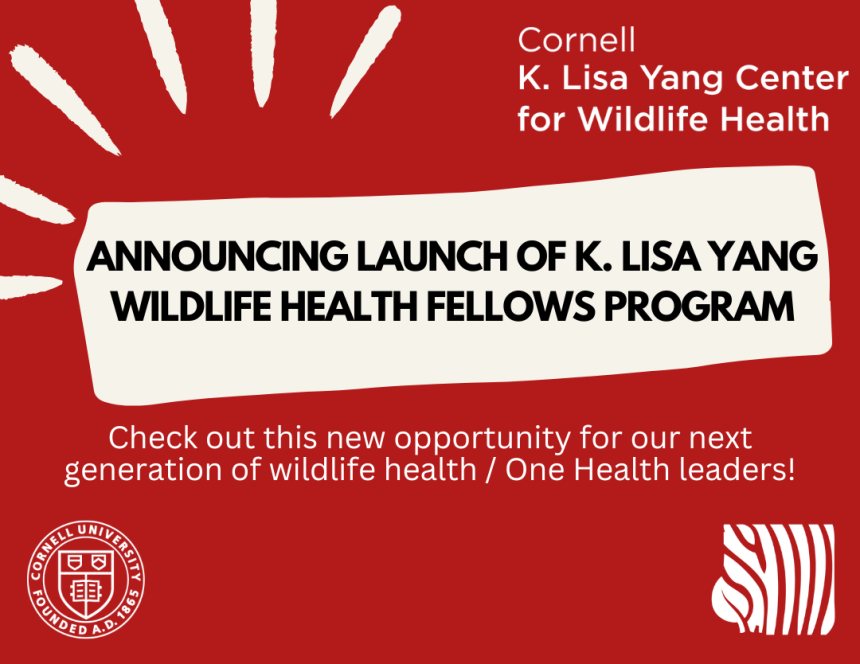In the News

Announcement
May 15, 2024
Check out this new opportunity for our next generation of wildlife health / One Health leaders!

February 14, 2024
Cornell University’s College of Veterinary Medicine announced a gift of $35 million to support the Cornell Wildlife Health Center, which has been renamed to the Cornell K. Lisa Yang Center for Wildlife Health in recognition of the scale of commitment to planetary health from the donor, Lisa Yang.

January 30, 2024
A transformational gift from philanthropist and Cornell alumna K. Lisa Yang ’74 will endow and rename the Cornell Wildlife Health Center as the Cornell K. Lisa Yang Center for Wildlife Health at the College of Veterinary Medicine.

January 03, 2024
My heart hammers in my chest as I unlock the door to the enclosure, my eyes hunting through the mesh to find the animal inside. It’s not just the heat making my palms sweaty as I open the door and duck inside; it’s not just the exercise making me short of breath. Of all the animals in the clinic, this is the one that terrifies me the most: the one-armed, two-toed sloth named Ace....

Blog
December 14, 2023
Cornell veterinary student Erica Jackson, DVM '25, discusses her experiences working at Six Flags Great Adventure Wild Safari in Jackson, New Jersey over the years.

December 06, 2023
Thanks to lifted pandemic restrictions and funding from both the San Diego Zoo Wildlife Alliance and the Cornell Wildlife Health Center Student Support Fund, I was able to travel to the opposite side of the country for the last six weeks of my clinical year for an externship at the San Diego Zoo Safari Park in California....

Blog
December 01, 2023
There are times in life where things don’t go as expected, including on June 13, 2023, when I showed up for the first day of my project at SANCCOB, the Southern African Foundation for the Conservation of Coastal Birds, as part of Cornell’s Expanding Horizons Program....

Blog
November 28, 2023
Cornell veterinary student Sergio Acuna Gutierrez traveled to Guadalajara, Jalisco in Mexico for ten weeks to work at the Zoológico Guadalajara. Home to over 3,500 animals from over 300 different species and built on a reserve at the edge of the Huentitan Canyon, Zoológico Guadalajara is one of the largest zoos in all of Latin America.

November 21, 2023
Did you know that the second most common cause of injured sloths coming into rescue centers is electrocution? If not, you are in the majority. There is little to no literature about sloth electrocution in the academic world, even though it is such a pervasive problem.

November 07, 2023
Cornell alumnus Bill Konstant ‘74 visited Cornell to give a talk to students, alumni, faculty, and the general public based on his memoir, Wrestles with Wolves: Saving the World One Species at a Time, hosted by the Cornell Wildlife Health Center and the Zoo and Wildlife Society.
